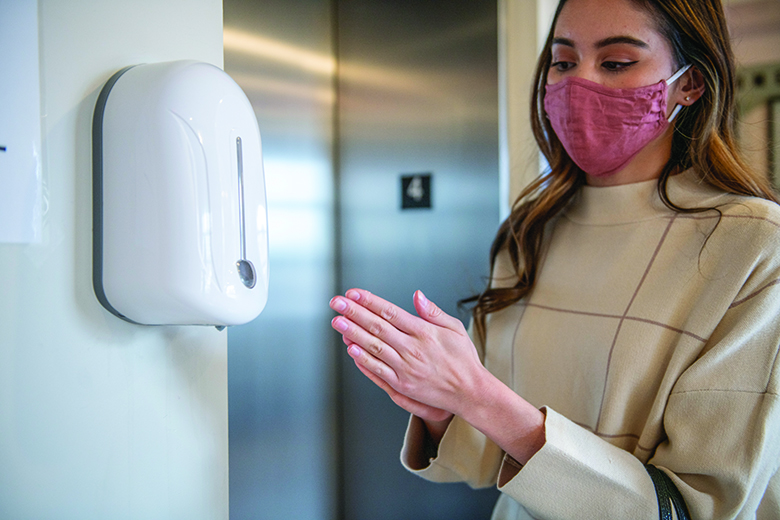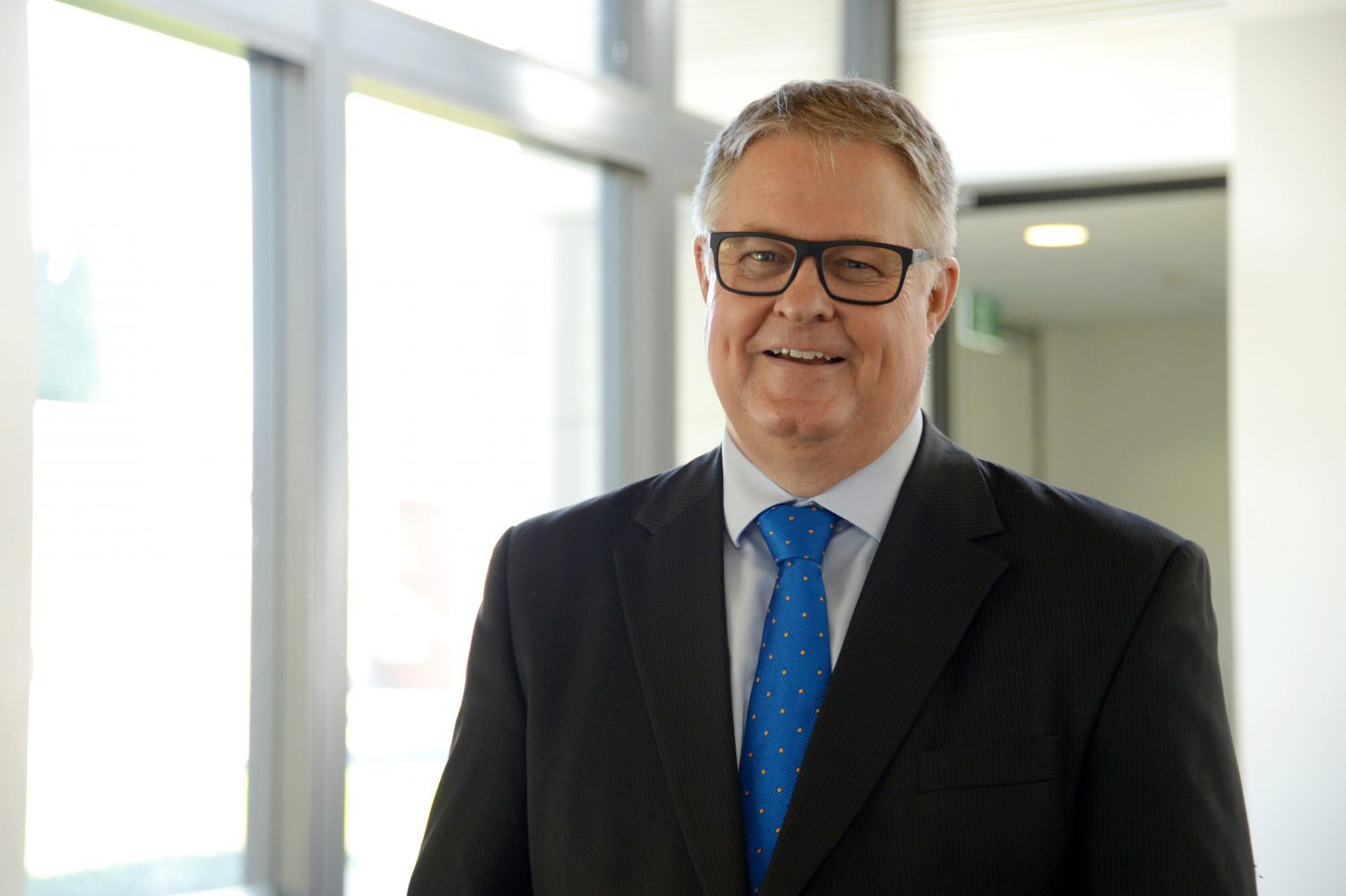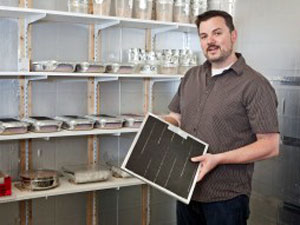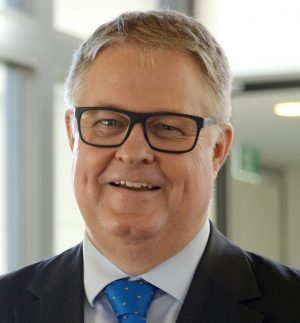
Innovation and technology are evolving in the paper and dispensing space as companies respond to COVID-19 infection threats, but one thing that is not changing is a commitment to customers and sustainability.
When Australian swimming superstars Emma McKeon and Ariarne Titmus compete at the Birmingham Commonwealth Games in July and August, they will be part of a hand-hygiene blitz that is drawing on the latest science.
About 3000 hand-sanitiser stations will be placed across 15 sites at the Games in England, but they will not just be located randomly.
Jonathan Weiss, commercial director of B2B for Europe, Australia and New Zealand at Reckitt, which owns Dettol, says the deployment of the dispensers will reflect expertise and insights from London School of Hygiene and Tropical Medicine behavioural science experts on sanitiser placement.
For example, Dettol’s research has shown that if a hand-sanitiser station is placed on the right-hand side of a door, usage will typically be 30 per cent higher than if it is placed on the left.
While the jury is out on why this is so – perhaps it could be that more people are right-handed – Reckitt and Dettol are using the findings to create “protected hygienic spaces in Birmingham, as well as at cricket stadiums, hotels and other venues around Australia.
Based on Reckitt’s experience from large events, sanitiser stations are more likely to be used when placed at points in queues where people have stopped, while Reckitt is putting clear and direct hygiene messaging on its dispensers – for example, “Sanitise here” is regarded as more effective than “Please sanitise”.
“Innovation in this space is more than just around the dispenser unit,” Weiss says.
“It actually brings an ambition to raise the bar on hygiene, and sometimes that can be through science innovation, signage, communication or even gimmicky things on hand-sanitiser stations that will get people to use them more frequently.”
Paper trail
In the washroom paper space, Solaris Paper is also responding to market needs as more employees return to offices following the removal of many COVID-19-related workplace restrictions.
Jeff Lewis, national business development manager at Solaris Paper Australia, which distributes tissue and hygiene brands such as Livi, Sorbent Professional and Handee Ultra, says sales volumes have been on the rise for the company’s commercial products in recent months, especially in sites such as hospitals and aged care, restaurants and cafes, hotels and offices.
“Demand has gone back to what you might call ‘the new normal’, but there are still significant supply-chain challenges,” Lewis says.
Those supply-chain bottlenecks have contributed to a massive spike in freight costs.
“Anything you’re importing or moving around Australia has pretty much tripled in terms of freight prices from where they were 18 months ago,” Lewis adds.
“As COVID eases and supply chains free up, hopefully we’ll see some recovery with freight costs as well. But customers understand the challenges and they’re quite prepared to pay extra for freight just to get product.”
For the dispensing of its paper products, Solaris Paper has been focusing on simple, high-volume stations that are easy to refill and service. Lewis notes that there has been some customer resistance to touch-free and electronic dispensing because of price premiums associated with that hardware.
“And if you have electronic machines and they fail, there’s no immediate backup,” Lewis says.
At your service
Kimberly-Clark Professional is committed to rolling out intuitive dispensing solutions that still meet customers’ budget needs.
The paper-products giant has launched its new ICON dispenser collection – which includes paper towel, toilet paper, soap and sanitiser dispenser options – and is designed with the cleaning staff, facility manager and user in mind.
“In Australia, we have seen an increase in demand for touchless dispensing and sanitiser, and we noticed this trend early during the pandemic,” says Simon Christensen, GM, Australia for Kimberly-Clark Professional.
He believes mindsets and attitudes towards hygiene and handwashing have shifted in the wake of the pandemic. A research survey it commissioned among restroom “users and choosers” in Australia has revealed present-day perceptions of cleanliness, as well as evolving hygiene habits, expectations and standards. The findings include:
- 63 per cent of public restroom users believe confidence in hygiene requires more than just the appearance of a clean facility
- almost 50 per cent of users surveyed indicated that amenities such as touchless soap dispensers, touchless disposable paper towel dispensers, and automatic doors are important to make them feel confident that the restroom is clean and hygienic.
- almost 50 per cent of decision-makers relating to products in facilities expect public restroom hygiene to be better in the next 12 months.
“The survey results demonstrate that now more than ever, washroom users need reassurance that their hygiene, safety and health are a top priority once they enter the washroom,” Christensen says.
At the same time, respondents note that cost-effective solutions and servicing are essential.
Home truths
On the back of Dettol’s trusted reputation for helping to provide protection against germs inside homes, Reckitt decided late last year to zero in on the business-to-business market via its Dettol Pro Solutions brand.
The program includes cleaning protocols for high-traffic, high-touch areas, hygiene-centred messaging and hand-hygiene solutions.
“It became very obvious that there was a need for greater protection for people outside the home – that the security blanket on hygiene had been lifted,” Weiss says.
He points to studies which have found that hand-washing compliance can sit as low as 17.4 per cent after using bathroom amenities.1
As a result, Reckitt is committed to educating the public, raising the bar on hygiene and making a difference to health outcomes, even though complacency about the pandemic has seen the volume of sanitiser use start to decline.
“In that environment, a normal business would walk away, but this is a purpose-driven company,” Weiss says.
“The need for hand hygiene has not gone away, and if people’s attention has waned it falls on us to drive better behaviours.”
At Kimberly-Clark Professional, Christensen says technology plays a critical role in keeping businesses and people safe.
“We are continually innovating to provide the restroom of the future,” he explains.
“People should be able to use shared equipment and spaces such as washrooms with as little surface contact as possible – from doors to sinks to touchless paper-towel dispensers – with access to sanitisation materials for contact surfaces.”
As part of its mission to create and enable healthier, safer, and more productive workplaces, the company relies on an understanding of its customers and the marketplace to innovate and provide a higher standard of hygiene and efficiency.
According to a recent Kimberly-Clark Professional survey, businesses’ key concern for restrooms pre-COVID was providing cost-effective products, with 25 per cent of survey participants listing this as their priority. That figure has now dropped to 7 per cent as business teams shift their focus to ensuring washrooms are as ‘touchless’ as possible (26 per cent, up from 9 per cent).
Perhaps the most telling figure is that 33 per cent of respondents strongly agree that the condition of a restroom is a reflection of hygiene standards for the rest of the establishment, with another 39 per cent moderately agreeing. That means there is no room for shortcuts with hygiene standards.
Sustainability still on the agenda
For all the changes and challenges that the COVID-19 pandemic has brought to the cleaning and hygiene sectors, one thing has not altered – a focus on sustainability.
Lewis says all of Solaris Paper’s products have independent sustainability certification through the Programme for the Endorsement of Forest Certification (PEFC) accreditation. “This ensures that throughout the supply chain, from plantation tree to the finished good, the product is 100 per cent certified sustainable and that will continue,” he says.
The company has a zero-tolerance policy for illegal fibre entering the supply chain. Lewis says if paper towels are produced from sustainable plantations and then dispensed properly in restrooms around the country, they can help boost health and hygiene standards while not harming the environment.
“Single-use paper towels are still the most effective and hygienic way of drying hands,” Lewis says.
Kimberly-Clark Professional believes customers are looking for businesses and brands that are aligned with their sustainability goals.
“When choosing products, customers demand responsible resourcing, including supply chains committed to helping drive change,” says Christensen, who points to the company’s manufacturing mill in Millicent, South Australia. It has achieved 98 per cent recycling efficiency and is progressing plans towards local carbon-neutral goals.
For its part, Reckitt has a three-pronged approach to sustainability. First, it has strong goals around reducing plastics, greenhouse gas emissions and waste.
Second, it is moving to ensure that all of its plastic wipes are biodegradable.
Third, despite being a chemicals business, it is advocating against the over-use of chemicals in the B2B space through its approach to targeted hygiene protocols.
Weiss says the key is to have “targeted hygiene, with the right product in the right space at the right time”.
He does not want companies blasting their sites with Dettol or using chemicals to try to deep-clean every crevice.
“The one-shot-kills-all approach is wasteful of chemicals and may have adverse impacts on the environment.”
[1] Sturgeoner, B.V.; Chapman, B.J.; Powell, D.A. University students’ hand hygiene practice during a gastrointestinal outbreak in residences: What they say they do and what they actually do. J. Environ. Health 2009, 72, 24–28.
This article first appeared in the July/August issue of INCLEAN magazine.
Comment below to have your say on this story.
If you have a news story or tip-off, get in touch at info@incleanmag.com.au
Sign up to INCLEAN’s newsletter.




